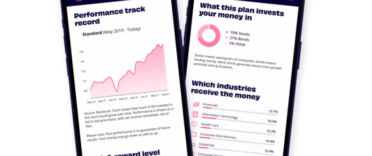 Many diligent savers may find the restrictive nature of the annual ISA allowance frustrating. However, a host of providers now offer a way around the strict deposit limits usually associated with ISAs. Known as a ‘flexible ISA’ this system lets you re-deposit any cash you have withdrawn from your account without it contributing towards your annual limit. This could seem like an attractive prospect that might draw you to a new provider, or an irrelevant add-on that will have little effect on how you spend and save your money. In this article we break down how a flexible ISA works, including the advantages and pitfalls, plus what kind of saver it will benefit the most.
Many diligent savers may find the restrictive nature of the annual ISA allowance frustrating. However, a host of providers now offer a way around the strict deposit limits usually associated with ISAs. Known as a ‘flexible ISA’ this system lets you re-deposit any cash you have withdrawn from your account without it contributing towards your annual limit. This could seem like an attractive prospect that might draw you to a new provider, or an irrelevant add-on that will have little effect on how you spend and save your money. In this article we break down how a flexible ISA works, including the advantages and pitfalls, plus what kind of saver it will benefit the most.
Can you take money out of an ISA?
You can almost always withdraw money from your ISA, but it might not always be free. How much it costs will mostly depend on the type of ISA you have. Fixed term ISAs often require you to pay a penalty to withdraw your cash before the end of the term, while Lifetime ISAs charge a penalty for withdrawals if you are younger than 60 and not using the money for a deposit on your first home. Stocks and Shares ISAs may come with withdrawal fees and limits, but you will need to check with your chosen provider.
Many ISAs offer easy access to your money whenever you need it. You can withdraw cash and make deposits for free. However, with some ISAs you will lose some of the tax benefits when you withdraw. This is because everyone has a limited ISA allowance of £20,000 per tax year. If you deposit your whole ISA allowance, and then subsequently withdraw some cash, many ISAs will not allow you to put money back in. The common exception to this rule is if your provider offers a flexible ISA.
How do flexible ISAs work?
ISAs can provide useful tax benefits to savers, but there are restrictions and rules too. The most significant is that you can only save up to £20,000 in one type of ISA per tax year.
The advantage of a flexible ISA is that if you deposit the full £20,000 at the beginning of the tax year, then withdraw some of it at a later date, you can put the money back before the end of the tax year. If your ISA is not flexible, there will be a strict deposit limit of £20,000, no matter how many withdrawals you make.
The logic behind this benefit is that you should not be penalised for saving money into an ISA just because you want or need to spend some or all of the money you have saved that year. In most cases the cash does not have to go back into the same ISA account. This means that you could withdraw money from your cash ISA and deposit it into your Stocks and Shares ISA. However, it does need to be completed in the same tax year, otherwise the deposit will count towards that year’s ISA allowance.
Keep in mind that withdrawals from some Stocks and Shares ISAs may incur fees. In addition, Lifetime ISAs are not flexible and you will be hit with a 25% penalty for withdrawing money before you turn 60 if you wish to pay for anything other than the deposit for your first home.
Can I transfer my existing flexible ISA?
You may find that a different ISA provider is able to offer you a higher interest rate on your savings, lower fees or better access to your money. In this scenario, you can switch your ISA to that provider whenever you choose, if it allows transfers of existing ISAs. It is important to note that an ISA transfer does not count as a new ISA subscription, so if you are transferring an ISA or ISAs from previous tax years, it will have no impact on your ISA allowance for the current tax year. Transferring to a new provider may however mean that you may miss out on some of the advantages of the flexible ISA rules.
For example, if you withdraw money from your existing flexible ISA and then subsequently decide to switch to a new provider that doesn't offer a flexible ISA, you will not be able to put the withdrawn money back into your account without it contributing to your ISA limit. Any deposits with your new provider will need to come out of your ISA allowance. This means that if you have already deposited £20,000 in that tax year, you will need to wait until 6 April to add any more money.
An exception could be if you have only transferred part of your ISA or you have another ISA with your original provider. In this case you may be able to deposit the money you withdrew earlier without it contributing to your ISA limit.
Should I get a flexible ISA?
The best savings account for you will depend on your financial situation and spending needs. However, the benefits of a flexible ISA are generally most applicable to savers who use their full £20,000 ISA allowance in a tax year. Savers who do not hit the cap will still have some wiggle room to withdraw and deposit their funds in a tax year.
For example, if you have saved £10,000 into your ISA in a tax year, but find you need to withdraw £5,000 for an unexpected expense, you can still save that money back into your ISA over the course of the tax year without passing the £20,000 limit.
If you save £20,000 in an ISA in a single tax year, but withdraw money, you can only add it back if you are with a flexible ISA provider.
You may also find that the benefits of a flexible ISA are not particularly relevant if you know that you will not need to access your ISA savings at all in a given tax year. If you have no plans to move your money, the flexibility will not be a benefit you can take advantage of.
Flexible ISAs are provided by financial institutions that choose to offer this feature – it is not a different form of ISA product. This means that you may already have a flexible ISA without knowing it, or that the best deal on the market happens to be from a provider offering flexibility.
Which providers offer flexible ISAs?
Flexible ISAs are offered by a whole host of big-name banks, smaller building societies and investment platforms. You are more likely to find a flexible cash ISA than a flexible Stocks and Shares ISA, though both are available. Some institutions offer flexibility on all ISA products, while others come with exceptions and limitations. Here are the main providers that offer flexible ISAs. We have included any limitations you should be aware of.
- Aldermore
- Bank of Scotland (Variable ISAs only)
- Barclays
- Bestinvest
- Charles Stanley Direct*
- Clydesdale Bank (Flexi cash ISA only)
- Coventry Building Society (Easy-access ISA only)
- Ford Money
- Freetrade*
- Halifax (Variable saver ISA only)
- IG
- Lloyds
- Metro Bank (Instant access cash ISA only)
- Nationwide
- Newcastle BS
- Paragon Bank
- Principality BS (Variable ISAs only)
- Skipton BS
- Tesco (Instant access cash ISA only)
- Trading 212
- TSB
- Vanguard
- Virgin Money (Easy-access ISAs only)
- Yorkshire Bank (Variable ISAs only)
Which providers do not offer flexible ISAs?
It is also worth taking note of the well-known providers that do not yet offer flexible ISAs.
- AJ Bell*
- Britannia
- Co-op bank
- Fidelity*
- First Direct
- Hargreaves Lansdown*
- HSBC
- Interactive Investor*
- Kent Reliance
- Leeds BS
- NatWest
- NS&I
- Post Office
- RBS
- Sainsbury's Bank
- Santander
- Shawbrook Bank
This information is correct at the time of writing. You should confirm the flexibility of your ISA with your provider, as policy can change at short notice.
If a link has an * beside it this means that it is an affiliated link. If you go via the link, Money to the Masses may receive a small fee which helps keep Money to the Masses free to use. The following link can be used if you do not wish to help Money to the Masses or take advantage of any exclusive offers - Hargreaves Lansdown, Interactive Investor, AJ Bell, Fidelity, Bestinvest, Freetrade, Charles Stanley


